I read you were the highest
grossing actor of the year.
I know!
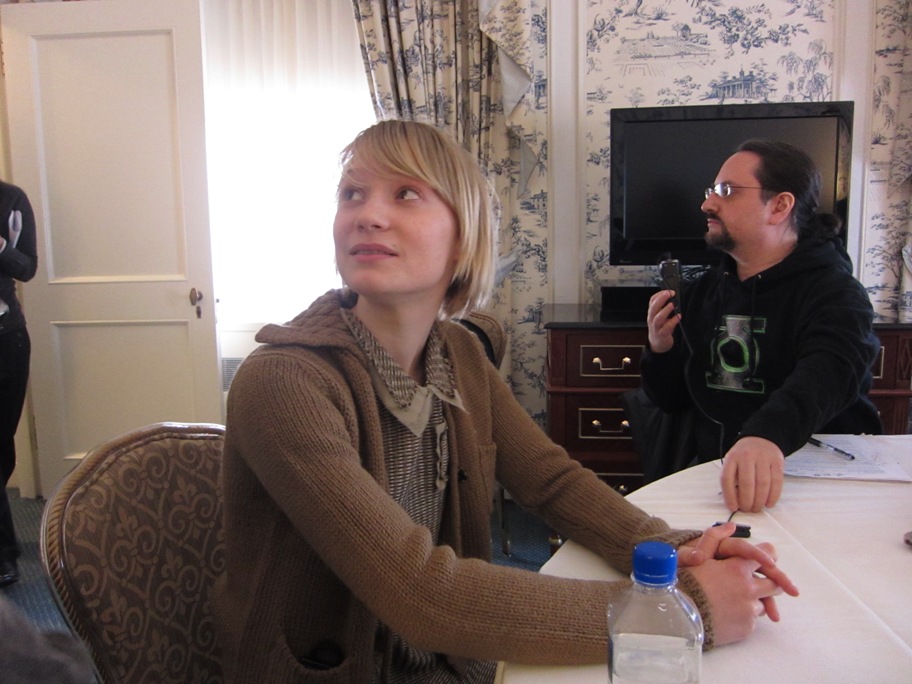 Do money matters like that
concern you in choosing a project?
Do money matters like that
concern you in choosing a project?
When it comes to choosing the
projects I do, no. Iíd rather choose a project that I think is
creatively fulfilling or exciting or challenging. Thatís what I
look for first.
When you see numbers attached
to the movies that youíre in, is it something you pay attention to?
I donít know. Itís not like I
would ignore it. But it depends what it is. It always depends what
the project is. Mostly, primarily, Iíd rather do something I think
is fulfilling.
How did you get involved in
this one? And what was it like as compared to doing Kids and
Alice?
Iíd just finished Alice.
Iíd just gone home to Australia. It was the first time Iíd gone
home after a film where I had no school. So, I made a list of books
I was going to read and Jane Eyre was on it. I started
reading it and I think I was on the fifth chapter and I emailed my
agent. I was like: this is great, is there a script around? Is
there anything happening with the story? She was like, ĎNo, not
yet, but Iíll keep it in mind.í Then, within a month or two later,
she emailed me back. It was like, ĎHereís the script and the
director would like to meet you.í So it was really kind of a case
of great timing. Iíd just read the book and I was very excited
about it.
Did you have any childhood
experiences with the Bronte sisters?
No, not really. Iíd really just
read it then. I mean, I knew who they were and Iíd heard of the
stories, but that was my introduction to it.
Over the last year, youíve
played two of the most iconic characters in British literature. As
a young actress, how gratifying is it to you that you get those kind
of roles?
Yeah, I feel really, really
lucky. They are roles that have been through generations and who
people have connected to over a number of years. So, yeah, itís a
huge deal to take them on and I feel lucky to have been trusted with
them. And it also sort of makes you the target of the bullís-eye.
(chuckles) But itís good fun, though.
What was your process like for
you to understand the character? Did you take it from the book?
I read the book and then when I
was on the production I read it again Ė went through underlining and
marking spots and really preparing for it as I read it.
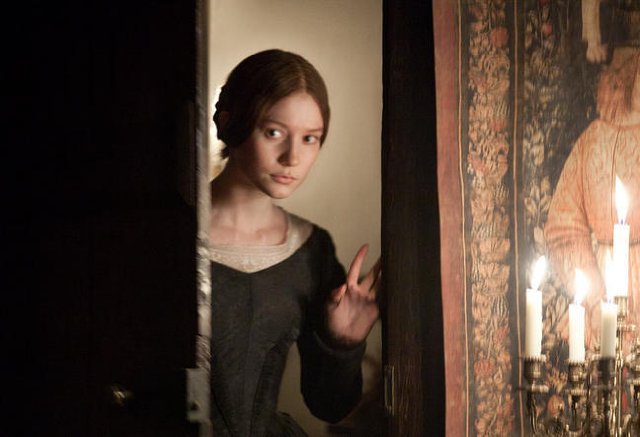 What did you think of the
adaptation? There have been so manyÖ
What did you think of the
adaptation? There have been so manyÖ
I thought it was great. And I
thought the way that it was structured was very interesting.
Immediately you start asking questions. Who is she? Whatís going
on? For people who donít know the story, youíre instantly drawn
into it and want to know whatís going on. So, that was really
smart. The challenge Ė when you are doing a book that is Janeís
internal monologue from start to finish Ė is to bring that richness
across to the screenplay. But, of course, you canít have her
talking all the time. Itís sort of like how do you keep her inner
curiosity? Itís a challenge to convey everything, because itís not
there in words.
Life was so formal and
repressed back then. Was it difficult as a modern actress to get
into that mindset?
Well, a lot of things help with
that, like the minute you put on the costumes and the corset.
Everybody talks about corsets, but itís true. Itís totally true how
hideously repressive it is. That affects your breath and your voice
and the way you stand. So thatís the beginning of repression, those
moments when youíre going ďDo I have the muffin, or the water?Ē You
have to sacrifice one or the other, because there is just a small
amount of space. Itís not too hard. The other thing about Jane is
that in her mind, she is a very modern character. I feel like if
you put her in our society now, she would thrive, which is why she
has lived for such a long time. People keep connecting to her.
How difficult is it for you as
a young Australian actor to do all these different accents?
I love doing accents. I really
enjoy it and it definitely becomes the character. To me, once I
establish an accent with a character, I canít imagine them without
it, so I read it in my head in the accent. It provides a different
challenge and dimension. I really like doing that.
Does it make you more
marketable?
Iím not sure. Iím not sure how
itís perceived. I would like to think it would. I donít know about
marketable. Iím not sure.
In terms of the rehearsal
process, when you read the script, how do you work the character
out?
I like to just read it a lot of
times. Especially when youíre dealing with language thatís period
language, itís important to make sureÖ itís a language we donít use
anymore, so itís important that it feels natural, itís inside you
somewhere. I like to read it a lot and also know it very well,
because with the research you build a framework of the character and
then you further it with yourself and your own experiences and your
emotions.
Were there particular ideas you
brought to the project yourself?
Yeah. Even with the accent, I
wanted to make itÖ there was just a hint of a northern accent in
there. I liked the idea that she wasnít completely finely tuned or
completely polished. We justified that because she was more or less
raised by Bessie, her nurse. Her accent would have been refined a
little through Lowood, but I liked the idea that she had a little
bit of her village.
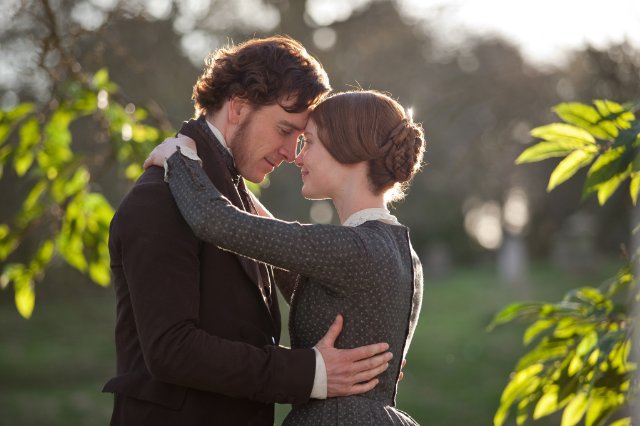 In Alice in Wonderland,
Tim Burton changed some of the elements of the classic story to make
it more modern. How important is it to make the book relevant to
the times?
In Alice in Wonderland,
Tim Burton changed some of the elements of the classic story to make
it more modern. How important is it to make the book relevant to
the times?
I feel like thatís one of the cool
things about in. A story thatís been done so many times often
reflects the society and the culture at the time that itís being
made. Even in ways you donít realize until time has passed. We all
had similar ideas of who Jane was and what was important to bring
out in the story. I liked the idea of bringing out a darker side Ė
and also a younger side. Jane was 18. I think I was 20 when I did
the role. So I was already two years older. Sheís really a
teenager. She is a teenager like any other teenager now.
The movie is very slow and
stately. Do you think young people will go to see it?
I hope so. I donít see Jane
Eyre so much of a period piece as it is a really great story Ė
particularly for young women. I hope it has an angle that will
bring young people to it.
How did you approach finding
the character of Jane Ė was it through the accent or the walk or a
more internal thing?
I think all of those things help.
Maybe thatís why I like doing accents, because itís another aspect
that takes it away from yourself and brings you into someone elseís
realm.
Do you think thatís an internal
thing or more of an external thing?
I guess itís both. If by
externally you use a different language or accent, then internally
that affects something. The same with the costumes Ė [they] are a
physical thing, but it becomes mental as well, the pain of being in
that all day.
When youíre on the set, do you
know what shot is coming and judge the performance based on that?
Usually I sometimes know, but no,
itís not something that Iím conscious of in terms of if itís a wide
shot you make it bigger. Itís always the same and then I guess they
change it when they cut it together to get better impact.
I was reading youíre very into
photography. Did you take photos on the set?
Yeah, I took a lot of pictures. I
love having another creative outlet that I have full control over
and photography has been a really therapeutic way of [getting
that]. Also, we get a lot of down time, even in between set-ups
thereís a lot of waiting around. Thatís fine, but I like doing
stuff in that period.
What was the best shot you got?
Iím not sure. I liked taking
pictures in between in close up. Sometimes the most interesting
composition is when you are in the center of everything and there is
all this attention that is focused on you. Youíve got a camera in
your face and a boom above your head. Often thatís the perspective
that isnít seen, which is what Iíve tried to do with my
photographs.
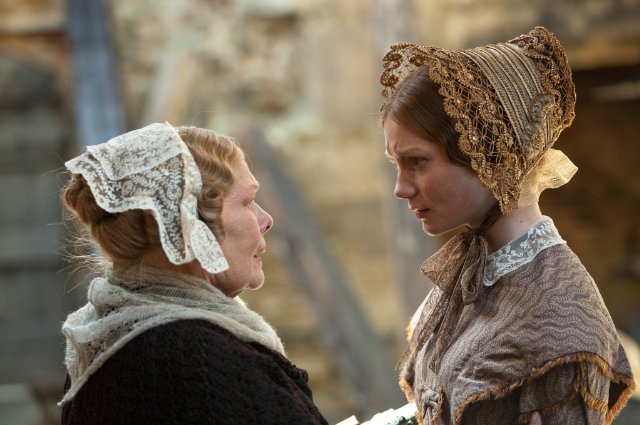 Speaking of downtime, Dame Judi
is notorious for the naughty pillows that she makes. Did you get
one?
Speaking of downtime, Dame Judi
is notorious for the naughty pillows that she makes. Did you get
one?
(laughs) No. I didnít get
a pillow. I didnít see any pillows on the set. Now Iím missing
out. Thanks!
Was she there the whole time or
was she just in and out?
She came in and out.
What was she like to work with?
Sheís wonderful. I mean, sheís a
legend and for any young actor to be able to work with her is [a
treat] Ö I mean just to see how she is on set. Sheís incredibly
professional. Sheís really modern and young. Her spirit is really
fun. Sheís just a consummate professional.
Is that a better investment
than acting school, actually working with somebody who is a master
like that?
Yes. Sometimes. For sure. Iíve
learned so much from everyone that Iíve worked with. Itís an
accelerated education. People ask me what is the best advice Iíve
gotten. Itís not like people go around giving me advice, but even
watching how they carry themselves in situations Ė thatís really
cool.
You had a great year last year
and now you are starting off the new one with a great role. What
are you looking for next year? Does it matter if itís a big movie
or a small movie?
Itís probably whatever the
material is. I feel like there is a lot of really interesting stuff
thatís happening in the smaller productions. Sometimes itís harder
to find more interesting or complex roles. But itís totally up to
what it is. But short of that, Iíve really enjoyed being part of
this whole production.
Whatís next?
A film called Restless
thatís coming out. [Directed by] Gus Van Sant. Itís coming out
later on this year. And I just finished filming Albert Nobbs,
which we shot in Ireland. Rodrigo Garcia is directing it and Glenn
Close wrote it.
Could you talk about working
with Gus?
Yeah, Gus is a hero of mine. I
watched his films when I was a teenager. They opened up a whole new
way of filmmaking for me. Then to be able to be on his set Ė he has
such a unique way of working. Heís really an incredible person.
The script, the story is beautiful. Iím very excited for that to
come out.
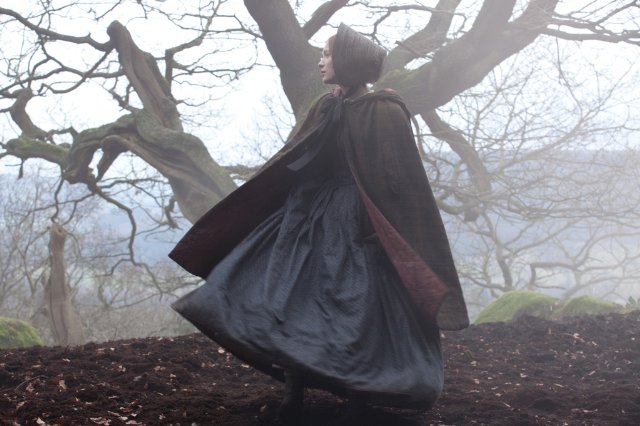 Annette Bening and Mark Ruffalo
from The Kids Are All Right just both got Oscar nominations.
Are you looking forward to watching them possibly winning?
Annette Bening and Mark Ruffalo
from The Kids Are All Right just both got Oscar nominations.
Are you looking forward to watching them possibly winning?
Yeah. Itís amazing. Itís so
deserving, both of them. They are both wonderful people and did
such brilliant work on the film, so I was really, really excited for
them both.
Do you know what youíre wearing
to the Oscars?
Iím not sure. I donít know yet.
Weíll see.
Maybe Mark can bring you as his
date.
(laughs) You could ask
him.
What film are you doing next
year? Is anything shooting yet?
There are two films Iím going to
do this year. One is called The Wettest County, which John
Hillcoat is directing. Then one called Stoker, which is
Chan-wook Park.
It seems like every week you
get announced for a new film. How does that make you feel as an
actress?
Itís great. Itís very
flattering. I feel very lucky to have those opportunities.
Have you had any experience
with Chan-wook Park yet? Iíve been told heís a very intimidating
man.
No, I havenít met him yet. But
Iím so excited.
Do you have any Broadway plans
while youíre here?
Iíd love to try and see some. It
depends if I have time.
Have you ever thought of doing
theater?
Iíd love to do
stage, when and if I can. Yeah, Iím definitely interested.
Email
us Let us know what you
think.